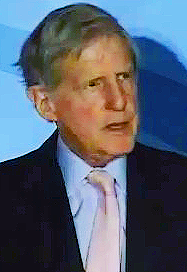Apr. 6, 2012, 4:33 PM
Were you annoyed by the "whining" in Jamie Dimon's annual letter to shareholders?
Go download and read the shareholder letter from M&T bank CEO Robert Wilmers. Breakingviews calls it the "must-read missive of the season."
Why? Because rather than whine about government regulation, Wilmers takes it to the banks themselves, and blasts the industry for destroying its own reputation.
The basic gist is that at one point banks were respected industries that facilitated economic progress. In the quest for growth and trading revenue at any cost, the industry became parasitical, ultimately causing the crisis.
Here are some key parts.
On the decline of the bankers' reputation:
As relatively good a year 2011 was for M&T itself, it was far from an easy one. Indeed, it is difficult, for one who has spent more than a generation in the field, to recall a time when banking as a profession has been publicly held in such persistently low esteem. A 2011 Gallup survey found that only a quarter of the American public expressed confidence in the integrity of bankers. We have reached a point at which not only do public demonstrations specifically target the financial industry but when a leading national newspaper would opine that regulation which might lower bank profits would be “a boon to the broader economy.” What’s worse is that such a view is far from entirely illogical, even if it fails to distinguish between Wall Street banks who, in my view, were central to the financial crisis and continue to distort our economy, and Main Street banks who were often victims of the crisis and are eager, under the right conditions, to extend credit to businesses that need it.Basically, there's a rot and loss of trust that's enveloped everyone:
It is no consolation, moreover, to observe that banks and the financial services industry generally were far from alone in sparking the crisis. Nonetheless, it is true, and very much worth keeping in mind, that major institutions in other sectors of the American system – public and private – must be considered complicit, some in ways we are only beginning to learn fully about. As understandable as a search for particular causes, or villains, might be, the truth is that the economic crisis that began in the fall of 2007 implicated a wide range of institutions – not only bankers but their regulators, not only investors but those paid to advise them, not only private finance but its government-sponsored kin. The wide spectrum of the culpable has left the U.S. and the world with a problem which, although related to the financial crisis, transcends it and must be confronted: the decimation of public trust in once-respected institutions and their leaders. This has created a fear among those responsible for forming the rules and standards that shape the American financial services industry. And the outcome of this fear-driven rulemaking is likely to burden the efficiency of the American financial system for years to come and will potentially have broader implications for the overall economy.Where it all began to go downhill:
All this began to change in the 1970s and especially the early 1980s as these banks grew and began a pattern of investing in areas where they possessed little knowledge – a trend, which culminated in money center banks forfeiting their mantle of leadership and tarnishing the reputation of the banking industry as a whole.
One might trace the beginning of this chain of events to the market dislocations caused by the OPEC-led increase in world oil prices. But panics and price bubbles have long been a feature of banking and investing, dating at least from the time of the 1637 Dutch Tulip Mania. Historically, however, the financial system has righted itself, responsibly, in the aftermath of such events. That was not the case, starting in the 1980s.
In a desire to expand their franchises, money center banks sought alternative investments and extended themselves into unchartered territories. Loans to energy companies (“oil patch” loans), shipping firms, and less developed countries (LDCs) became the flavor of the day. In venturing into these lines of lending, they chose to ignore the strong and prescient 1977 warning by Federal Reserve Board Chairman Arthur Burns, who observed that “under the circumstances, many countries will be forced to borrow heavily, and lending institutions may well be tempted to extend credit more generously than is prudent.”He even calls out some specific villains:
So it is that the crisis was orchestrated by so many who should have, instead, been sounding the alarm – not only bankers but also regulators, rating firms, government agencies, private enterprises and investors. That a former U.S. Senator, Governor and CEO of a big six financial institution was at the helm of MF Global on the eve of its demise due to trading losses, or that the largest-ever Ponzi scheme was run by the former chairman of a major stock exchange will long be remembered by the public. The repercussions have stretched beyond banking, creating an atmosphere of fear affecting and inhibiting those who should be leading us toward a better post-crisis economy.It really is epic, and these excerpts aren't enough to do it justice. Read the whole thing here

0 nhận xét:
Đăng nhận xét